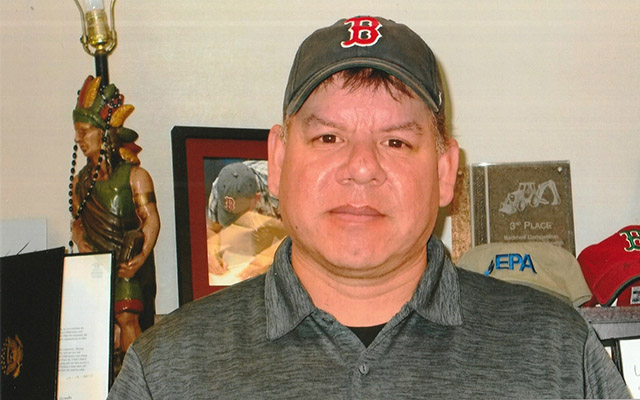Edward Peter-Paul of Presque Isle first became Tribal Chief of the Aroostook Band of Micmacs in 2013. Now in his second four-year term as chief, he attributes the tribe’s recent achievements not just to himself, but knows that working with his fellow community members will lead to a better future for everyone. That commitment to community values has shaped much of who he is today.
When Peter-Paul was 5, his family moved from Aroostook County to a Micmac community in Canada. He remembers growing up when families and community members did everything together. People visited each other often and both adults and children were always outside playing baseball or swimming during the summer or ice skating during the winter.
The family moved to Mars Hill when he was in the fifth grade, and after the move he did not feel the same community bonds that he did in Canada.
“My parents had a lot of friends and family. Everywhere we went there were kids playing outside and people talking and laughing. It seemed like we were always doing something,” Peter-Paul said. “What I remember most is a sense of community. I don’t know how much of that is practiced today. I think it’s coming back slowly.”
While growing up, Peter-Paul formed close relationships with many generations of his family, and learned some of his best lessons observing how they interacted with each other. His parents are two of the most influential people in his life, who taught him and his five siblings about family values such as respecting others and having a good work ethic.
“I think it’s how they interacted with people and how compassionate they were,” Peter-Paul said. “My parents would help anybody that needed help even if they didn’t have much. They taught us by example.”
Peter-Paul first decided to run for tribal chief because he knew he could make a difference in his community. He has led economic development efforts, which has so far resulted in the tribe’s new wellness center. Much of Peter-Paul’s goals involve creating better employment opportunities to encourage tribal members to stay in the area.
“Early on I wanted to be the one to make the changes. Once I was voted in I thought about how I didn’t want those changes to be about me as a person,” Peter-Paul said. “I wanted to do what’s best for the community. There’s not one person that stands out because it took all of us working as a group to make these changes.”
In recent years, Peter-Paul has learned many historic facts about the Micmac tribe. He has read many historical documents that tell about the Micmacs’ involvement in the forming of the United States. He discovered that during the Revolutionary War, a man stood up at a government meeting and said, “Without the Micmacs we’re never going to defeat the British. We need the Micmacs on our side.”
Another little-known fact, Peter-Paul said, concerns the Treaty of Watertown. On July 19, 1776, the Micmacs signed the Treaty of Watertown with the U.S., the first treaty that the U.S. signed with a sovereign nation. In the treaty, the tribe and the U.S. pledged allegiance to each other and promised to form a bond that they wouldn’t break. Though the Micmacs became a federally recognized tribe in 1991, Peter-Paul considers the Treaty of Watertown the first time that the U.S. government officially recognized them.
“A lot of our history is oral, sitting down and talking to people. When I find something out that’s factual, I’ll share it with people,” Peter-Paul said. “I like educating people on who we are, especially the history that they don’t know.”
In the future Peter-Paul wants to teach younger tribe members about their history and culture and the values he learned from older generations.
“I constantly think, ‘How is this decision going to affect future generations? Is it fair? Are we being honest and open?’” Peter-Paul said. “Those are things that we, as a Native community, think about.”








